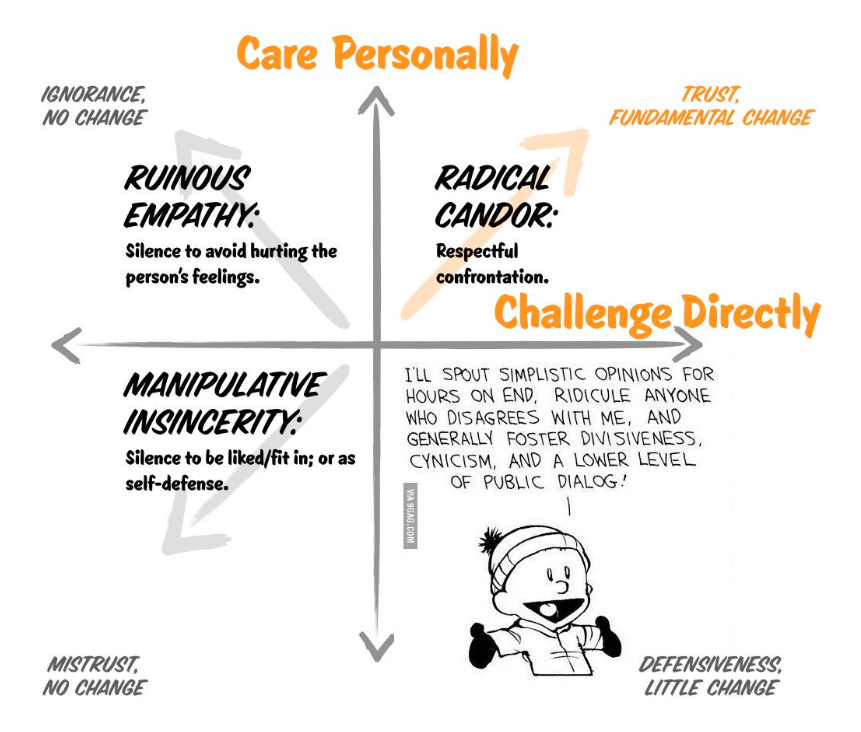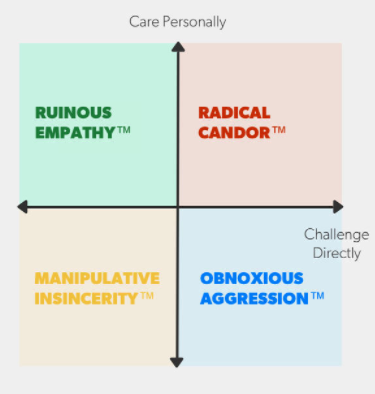I find myself referencing Radical Candor in many conversations over and over again. It’s a very powerful, simple and useful concept from a book by Kim Scott. I haven’t read the book yet, but the chart alone has given me tonnes of mileage.
Here are some blogposts from the site that are worth reading:
- Radical Candor is NOT Brutal Honesty – it’s not about saying mean things, it’s not “honestly, you’re a shitty colleague”. It’s about being kind and helpful, and making an effort.
- What to do when you’re being Radically Candid but everybody thinks you’re a jerk…
- Feedback: Don’t dish it out till you prove you can take it
- On Receiving (and Truly Hearing) Radical Candor
So – there are just two variables to consider – Care Personally and Challenge Directly. Few people are able to do both at the same time. Doing one and not the other can lead to bad outcomes.

Different people have different problems and need to adjust their behavior in different directions.
Some people are too nice.
Some people are too mean.
It might seem like nice people get hurt while mean people hurt others – but the opposite is also true in a 2nd-order way. Nice people also hurt others by failing to give them good feedback, and mean people also hurt themselves by depriving themselves of healthy relationships.
Some people can’t even conceive of radical candor – they think you’re either caring or challenging. Optimal relationships involve both.
There are people who say, “if you cared about me, you wouldn’t challenge me. Any attempt you make to challenge me is a personal attack.” This is unhealthy, and leads to ruinous empathy.
On the other hand, there are people who say, “I’m only challenging you because I care about you, nobody else says anything because they don’t care about you the way I do.” They might even believe this, personally. But it can be an excuse to be a dick.
On bad advice
“If you don’t have anything nice to say, don’t say it at all.” – this is generally decent advice for dealing with polite dinner table conversation, but it’s bad advice for more important relationships – because then you’ll end up having frustrations that never get addressed.
“Don’t take it personally” is also bad advice. Empathize with the person’s frustration. But recognize that criticism is always going to be personal. Be there with them through that.
“Honesty can be a blunt instrument that bloodies more than it cuts.” This is a line from 48 Laws of Power that blew my mind when I was a teenager. It made me realize that I was often hurting people with my exuberant criticisms. If I wanted people to take my criticisms to heart, I was going to have to be more sensitive – making sure that they’re receptive to it. After all, what use is criticism that the recipient doesn’t internalize? You just wasted both people’s time.
–
(In response to the idea that applauding old married couples = applauding masochism): The challenge in any relationship is to stay in the nourishing quadrant, AKA the radical candor quadrant. It’s an enriching and heartening place to be. Nobody manages to be there 24/7 of course. Everyone is going to laps occasionally. Some relationships are full of ruinous empathy or obnoxious aggression, in cycles of codependency and drama. That’s definitely masochistic. If a relationship is nourishing, that’s worth applauding. It takes work, but it’s a gift that pays forward. Like watering a tree that provides fruit and shelter, etc.
–
“In my experience, skilful, enriching confrontation is a rare skill that few people have, most confrontation ends up being counter-productive. You have to confront the problem without attacking the person. Hate the sin and love the sinner.”
hm. there are people with good intentions who bungle everything, & there are people with ill-intent who play the long game when manipulating
I don’t disagree with this – what I’m hearing is that intellectually dishonest groups cannot grow. There’s a 2×2 radical candor map here – a space must both care+challenge to grow
— Visakan Veerasamy (@visakanv) May 17, 2018
